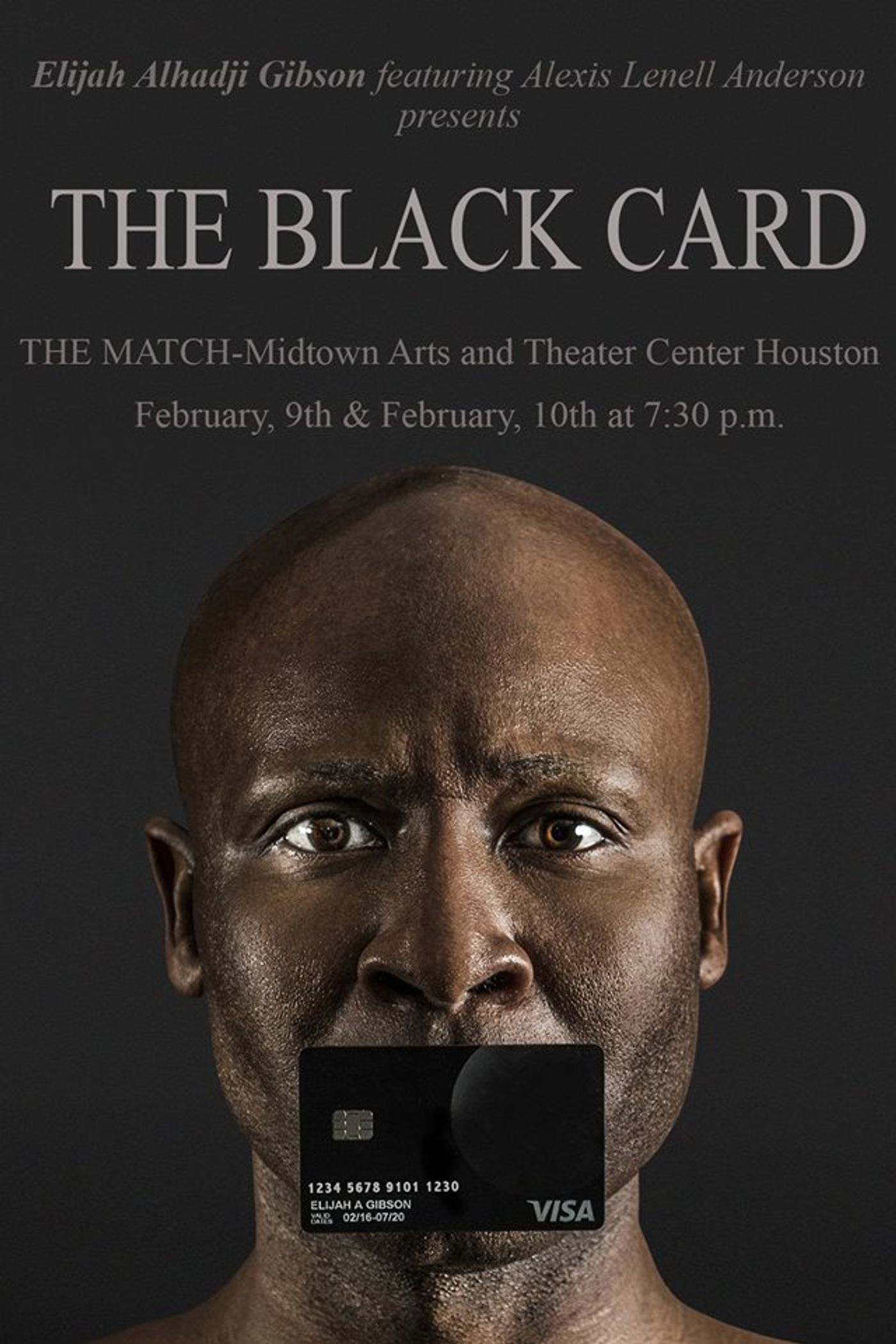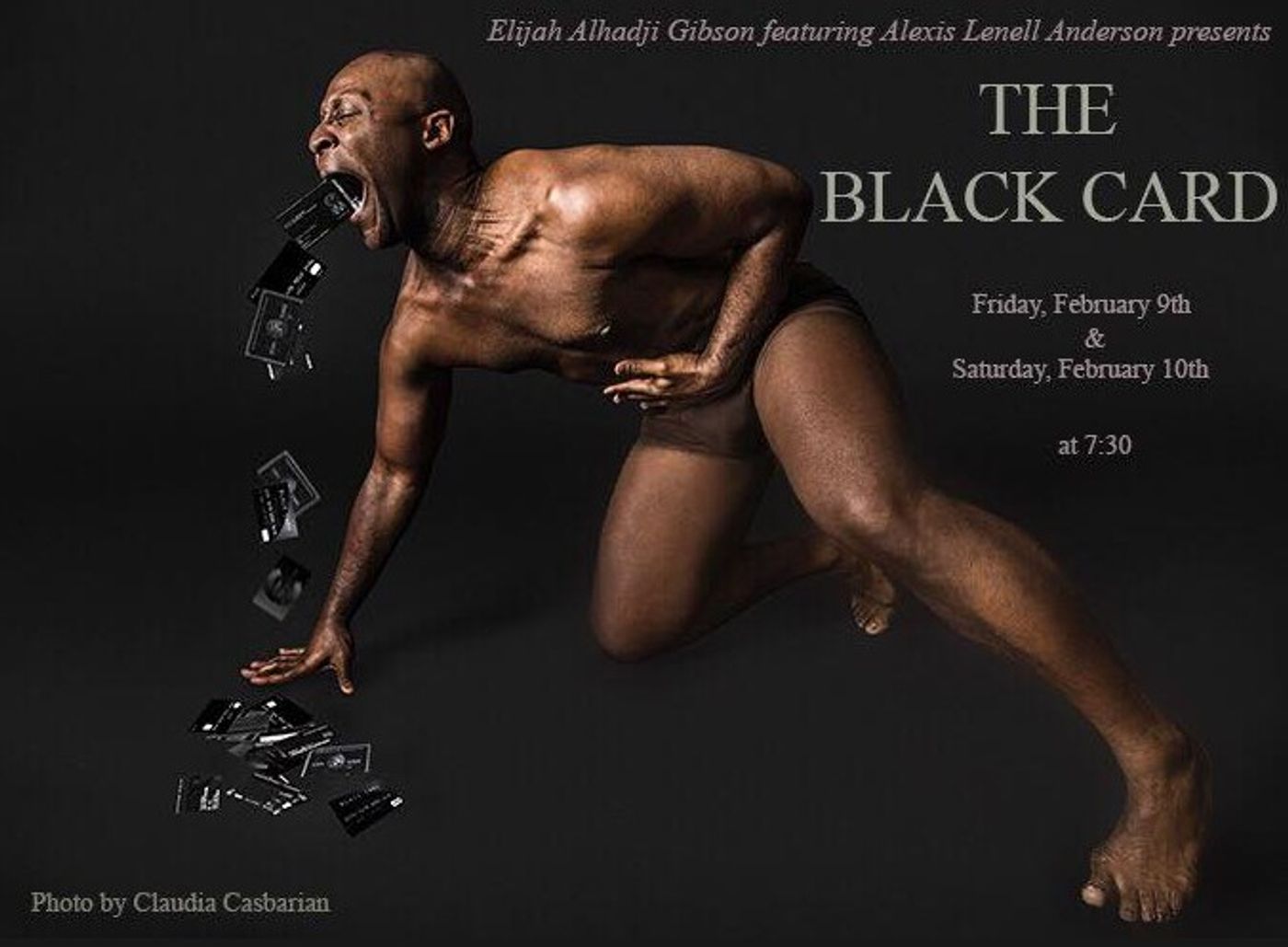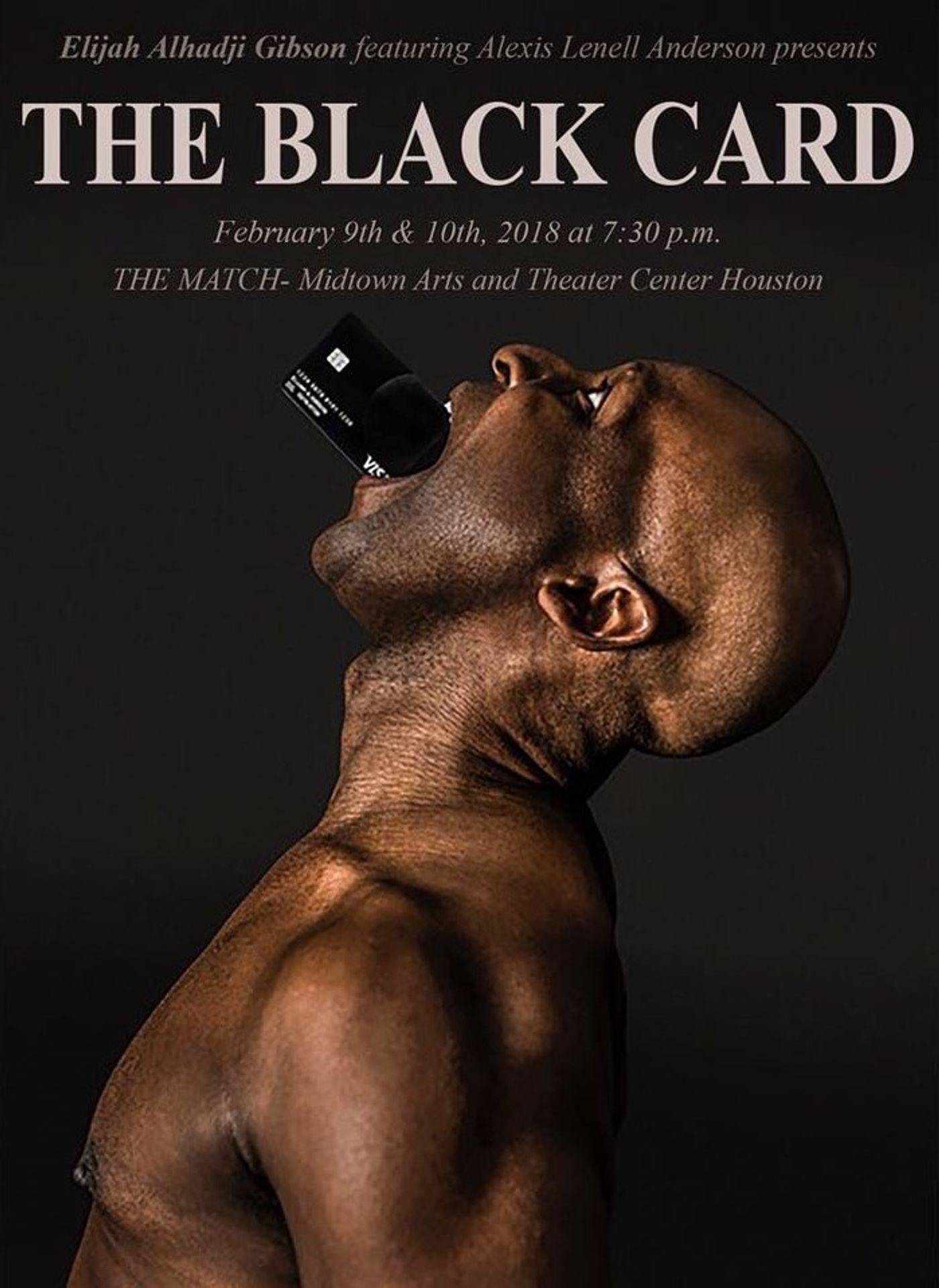Interview: THE BLACK CARD at THE MATCH- Say It Loud, I'm Black and I'm Proud!
 So I was sitting in the theatre at Sam Houston State University and Taylor Swift's "Shake It Off" blares from the speakers. The stage was filled with a handful of bubbly dancers doing the pony and dancing their hearts out to what I thought was a social dance piece. Little did I know that this dance was definitely a socially conscious piece that centered on cultural appropriation and ye old mantra of "if we assimilate to their culture then they will look at us as equals." Sitting and talking with Mr. Elijah Alhadji Gibson was a joy and I love when an artist is unapologetic and takes a risk. Many times artists get in a repetitive creative cycle and the art produced is contrived and has no visceral meaning. Yes I do believe in movement for movement's sake, but there is something about a piece that forces you to look through life from another person's perspective. It was my theatre director Dr. James Miller who said that when we walk into the theatre we come in one way and when we leave we are supposed to be a changed human being. Does this mean that we are to conform to the artists ideals and philosophies? No! But it forces us to realize that we aren't on this earth alone and that in order for us to move forward as one race then we must learn the history of one another. We don't know what it's like until we've danced in someone else jazz shoes. As a director and proponent of socially conscious work, watching pieces that tackle racism, sexism and gender equality get me going. So, I had the chance to sit down with Elijah Gibson, choreographer of THE BLACK CARD - A DANCED EXPLORATION OF SOCIAL INJUSTICE.
So I was sitting in the theatre at Sam Houston State University and Taylor Swift's "Shake It Off" blares from the speakers. The stage was filled with a handful of bubbly dancers doing the pony and dancing their hearts out to what I thought was a social dance piece. Little did I know that this dance was definitely a socially conscious piece that centered on cultural appropriation and ye old mantra of "if we assimilate to their culture then they will look at us as equals." Sitting and talking with Mr. Elijah Alhadji Gibson was a joy and I love when an artist is unapologetic and takes a risk. Many times artists get in a repetitive creative cycle and the art produced is contrived and has no visceral meaning. Yes I do believe in movement for movement's sake, but there is something about a piece that forces you to look through life from another person's perspective. It was my theatre director Dr. James Miller who said that when we walk into the theatre we come in one way and when we leave we are supposed to be a changed human being. Does this mean that we are to conform to the artists ideals and philosophies? No! But it forces us to realize that we aren't on this earth alone and that in order for us to move forward as one race then we must learn the history of one another. We don't know what it's like until we've danced in someone else jazz shoes. As a director and proponent of socially conscious work, watching pieces that tackle racism, sexism and gender equality get me going. So, I had the chance to sit down with Elijah Gibson, choreographer of THE BLACK CARD - A DANCED EXPLORATION OF SOCIAL INJUSTICE.
Mr. Gibson couldn't have timed this concert any better. I highly encourage you to celebrate Black History Month at the theatre and get a hearty dose of truth, light and most of all a creative masterpiece known as THE BLACK CARD! See you at the theatre!
BroadwayWorld: So Elijah, what is THE BLACK CARD and why this title?
Elijah Gibson: THE BLACK CARD is a collection of choreographed works that provide a glimpse inside my personal experiences dealing with race, cultural affirmation, and expression in the United States. The works illustrate the problematic duality of assimilation, specifically, how one may reject their own cultural identity to compromise/fit in, and the aftermath of those choices. I express the constant struggle to resist the established system of oppression that hinders the pursuit of the "American Dream," and explore the boundaries of cultural appropriation and appreciation. And offer a solution of reconfiguring the ideas and values that have shaped the nature of oppression in this country.
 BroadwayWorld: How was the creative process with your dancers?
BroadwayWorld: How was the creative process with your dancers?
Elijah Gibson: This has been one of the most enjoyable and liberating creative processes I have ever had. When you have artists who trust and believe in your work, they completely dedicate every ounce of their artistic ability to bring forth your vision with the utmost integrity. These dancers are what I call Giblets. A Giblet is a word that was created by a group of dancers I used to work with years ago, who I happened to raise/train. When my dancers get to the point to where they can eat, sleep, and breathe my every thought, they become Giblets. It takes a while before you can assume that familial tie. These dancers are my Giblets. What makes them so special is that they aren't just dancing these works, they are also very much connected to these issues. Often times, as the day of a show approaches there is some nervousness regarding the dancers. I don't really have that concern. I also collaborated with an extremely talented emerging artist, Alexis Anderson. She has been a great addition to this process. She most definitely is someone the dance world should keep a lookout for.
BroadwayWorld: What do you want your audience to feel/think at the end?
Elijah Gibson: In all honesty, I'm not trying to force any particular thoughts or emotions upon the audience. There will be groups of people who come from different backgrounds who all have had different experiences in life and in regards to content being presented throughout the show. Some people will be able to empathize, some will only be able to sympathize, and some will be able to do both. I do want the audience to get a glimpse of what my experience has been and hopefully learn from it. The sad reality is that there will be some who will leave this show thinking that they just saw a show, and I'm perfectly okay with that, too.
BroadwayWorld: Is this for a niche audience?
 Elijah Gibson: This is not for a niche audience. While the experience of racism is inflicted upon particular groups of people, many from all walks of life experience oppression and discrimination of some form. I merely chose this particular lens to illustrate my experiences through because it's something that has majorly impacted my life and those around me.
Elijah Gibson: This is not for a niche audience. While the experience of racism is inflicted upon particular groups of people, many from all walks of life experience oppression and discrimination of some form. I merely chose this particular lens to illustrate my experiences through because it's something that has majorly impacted my life and those around me.
BroadwayWorld: In three words, describe this work.
Elijah Gibson: Unashamedly and Unapologetically Black.
BroadwayWorld: Why this concert and why now?
Elijah Gibson: The majority of my concert work is based on the human condition. Whether it's social, political, emotional, etc. Sometimes the inspiration of the work is from a personal standpoint and sometimes from things I've witnessed. Not that these topics of discussion haven't been a problem for me, they just happen to now weigh heavily upon my spirit and being. It's also a discussion that needs to be had and addressed, so why not do it through the most universality means of communication, dance. Even when we can speak the same language, we all know what dance is.
THE BLACK CARD will be presented at 7:30 p.m. on February 9 and 10 at The MATCH, 3400 Main. For more information, call 713-521-4533 or visit matchouston.org. $25.
Videos

